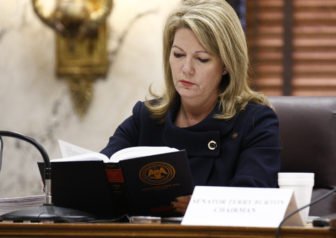

PSC
Public Service Commissioner Brandon Presley
Mississippi, a rural state that has long lagged behind most in high speed internet access, is leading the nation in expanding that access with recent investments from the federal and state government, officials say.
“Right now in Mississippi, by most estimates we have the largest expansion of fiber to the home, broadband in America when you look at the number of customers who will be served,” Northern District Public Service Commissioner Brandon Presley, a four-term public service commissioner, said recently during a lengthy interview in his office in the Woolfolk state office building in Jackson.
By the end of 2020, 2,765 miles of fiber optic cable passing by 28,447 homes and businesses are slated to be installed. And in 2021, another 1,980 miles of fiber are scheduled to be installed, passing by 17,309 homes and businesses.
“Every household may not be hooked up, but it will be available in those areas,” Presley said.
This rapid expansion in Mississippi is needed since the state is at or near the bottom in internet access, according to several studies. According to a 2018 report by BroadbandNow, Mississippi led only Montana in internet access with 70 percent coverage across the state. Mississippi also is trailing most states in terms of the speed of the internet offered.
Earlier this year, the Legislature opted to appropriate $75 million of the $1.25 billion it received in federal Coronavirus Aid, Relief and Economic Security Act funds to expand high speed internet. Of that pot of money, $65 million is reserved for the state’s customer-owned electric power cooperatives, and $10 million is set aside for private providers. The grants must be matched by the co-ops and the providers on a dollar-for-dollar basis.
The Legislature requires the internet that will be installed using the CARES Act funds to provide 100 megabits download and upload speeds — what Presley calls “the gold standard of internet speed.”
“This legislation brings connectivity to the world for our children, educators and parents, and is a giant leap forward for our state’s future,” Lt. Gov. Delbert Hosemann said.
The electric cooperatives, called co-ops, were founded in the 1930s to provide electricity to a large geographic area of the state, including most of rural Mississippi. A law passed by the Legislature in 2019 and championed by Presley allows the co-ops to provide internet service.

Rogelio V. Solis, AP
Former state Sen. Sally Doty
“This is similar in scope to the early 1900s when co-ops provided electricity to rural homes,” said Sally Doty of Brookhaven, a former chair of the Senate Energy Committee and the recent appointee of Gov. Tate Reeves as executive director of the Public Utilities staff, which was tasked with awarding the grants. “Fast and reliable internet is really a necessity and a lifeline to the rest of the world.”
In addition to the state grants, Mississippi is also in line to receive as much as $940 million during the next 10 years in federal Rural Digital Opportunity funds. That money comes from a small federal tax customers pay on their phone bills. The program originally was developed to help ensure landline phone service to rural areas. More recently, the funds have been used to build cell phone towers in rural areas, and now the Federal Communications Commission is expanding the program to enhance internet access.
The state is slated to get its first installment of those funds — $94 million — in 2021.
These recent actions could help Mississippi move up the list of states in offering high speed internet accessibility, many state officials hope.
“To me we could have a grand slam,” Presley said. To highlight the potential impact of the federal funds, Presley displayed a chart detailing how 223,152 homes and businesses could be eligible for high speed internet based on the money the state could receive over a 10-year period from the federal Rural Digital Opportunity program.
“We should come out of COVID-19 with lessons learned and with the capability that if we must ever transition to distance education, we should do so with the same ease as switching on a light switch,” Presley said. “It should be seamless, and the only way to do that is to make sure every home has high speed internet available if they want it.”
The push to improve high speed internet access in Mississippi began in earnest in 2019 when the Legislature — by an overwhelming, bipartisan margin — passed the Broadband Enabling Act to allow the state’s electric cooperatives to begin offering broadband services. Presley began advocating for the program in 2017 after seeing the success of a rural northwest Alabama electric cooperative in expanding high speed internet to customers in its service region.
While the legislation allowing the rural electric power associations to offer internet services was popular, most agreed that the process of the customer-owned, non-profit associations installing the equipment to provide high speed internet would be slow and expensive. And some of the cooperatives would opt not to get into the business.
The process has been sped up by the COVID-19 pandemic. The closing of schools this past spring has highlighted the need of high speed internet to provide distance learning and to allow people to work from home.
“The calendar is not in our favor when it comes to distance education,” said Presley. “That is not anyone’s fault…but that is the fact. But we should never have to debate (high speed internet) necessity again. People are going to ask us when the evidence was there what did we do.”
Despite the progress, there are areas of the state where no one applied for the state grants to expand rural broadband service. There are 26 counties where no electric cooperative or other provider applied for grants to expand broadband.
Officials hope the federal money will fill some of those gaps, or co-op customers can apply pressure on their boards to offer internet service. Thus far, 15 of the 25 cooperatives have committed to providing broadband.
Another issue is that some areas of the state — like the Wren area in Monroe County and the Holly Springs area in Marshall County — are lacking service because residents in those areas receive electricity from municipal utilities. State law does not allow municipal utilities to offer internet service, and the areas are not populous enough to attract private providers.
“There needs to be some accommodation in the law to help people who live in those areas,” Presley said. “They should not be punished because of where they live.”
Doty said in the short term, many school districts will have to install hot spots in areas lacking high speed internet to accommodate distance learners in the era of the pandemic. The Legislature appropriated $200 million in CARES Act funds to help school districts with distance learning, including funds to ensure all students have a laptop or some other WiFi device so they can participate in school from home.
“I think with the pandemic the jury has returned a verdict,” Presley said. “We should never spend another breath in Mississippi debating whether internet service is a necessity or a luxury. It is a necessity.”
The post Mississippi, lagging in high speed internet, uses pandemic relief funds to expand access appeared first on Mississippi Today.
- Scott Colom raised most money, but Cindy Hyde-Smith has most cash before March primary - February 21, 2026
- Patients face canceled surgeries and delayed care amid UMMC cyberattack - February 20, 2026
- Goal is ‘better alignment, not bigger government’ for Mississippi tourism - February 20, 2026